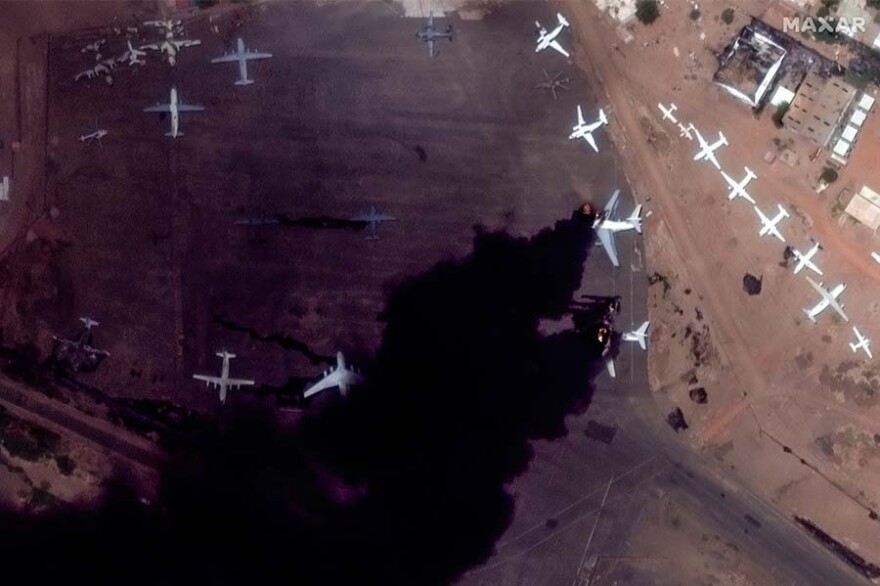Updated April 17, 2023 at 11:47 AM ET
Three straight days of conflict between two militarized factions have made once-quiet neighborhoods in and around the capital, Khartoum, feel like a war zone. More than 100 civilians have been killed and 365 others have been wounded, according to the Sudan Doctors' Syndicate. The UN World Food Program said Sunday that it was halting all operations in Sudan after three of its employees were killed in the fighting, and a humanitarian aircraft was damaged in crossfire.
NPR's Emmanuel Akinwotu described on Up First a "nightmare" for civilians, where "places they used to eat, buy groceries, see family and friends have basically been turned into a battlefield right before their eyes."
Zeinab Mohammed Salih, a journalist in Khartoum, has been sheltering at home from the bombardments and artillery fire outside.
"There's heavy gunfire all over the city. Military jets are over us all the time. There's a small market nearby but there's a shortage in food. And you can't go out," she told Up First on Monday.

Why is there fighting in Sudan?
Jeffrey Feltman, a former U.S. special envoy for the Horn of Africa, tells NPR's Leila Fadel that the days-long bloody struggle is the result of a "lust for power." It has now become what he calls a "fight to the death" between leaders of the Sudanese army and the rival paramilitary Rapid Support Forces (RSF).
The two rival generals have been in what Jeffrey Feltman calls a "marriage of convenience" since a military coup ousted the regime of Omar al-Bashir in 2019. He says a "partnership of mutual interests" between Sudan's commander of the armed forces, Gen. Abdel-Fattah Burhan and the head of the RSF, Gen. Mohammed Hamdan Dagalo, was based on undermining civilian aspirations for democratic rule and rejecting accountability for past crimes, including genocide in Darfur.
"In the end, that partnership did not define who would end up being on top," Feltman says. "So what you have now is a fight to the death for who is going to prevail and should military rule continue in Sudan."

What we know about the warring factions
Feltman says Sudan's effort toward democracy, which had been galvanized by widespread protests, was effectively derailed in October 2021 when the civilian government was overthrown and Prime Minister Abdalla Hamdok and his cabinet were jailed by the military leadership.
"They're basically contemptuous of the civilian aspirations of the population," according to Feltman.
Pro-democracy activists say both generals are guilty of human rights abuses.
Human Rights Watch accused security forces under Burhan of the unlawful detention of hundreds of protesters and the forcible disappearances of scores of people following the coup in 2021.
The RSF forces led by Dagalo, who is widely known as Hemedti, grew out of the Janjaweed militias that were blamed for a brutal crackdown and what humanitarian groups called genocide in Sudan's Darfur region. Under plans for a power-sharing military council, the RSF leader was to become Burhan's deputy. Instead, the deal was delayed by disputes over when civilians would assume oversight. And on Monday, Sudan's army chief labeled the RSF a rebellious group and ordered it disbanded.
Watching a descent toward civil war
During civilian protests and coups in Sudan, it is common for authorities to shut down internet access across the country. That has not happened this time, and Akinwotu's reporting suggests that is because there's a propaganda war going on, as well, and for that, both sides need the internet.
Diplomats – from the U.N. secretary general to the heads of the Arab League and the African Union Commission – are demanding a cease-fire.
In Japan for a Group of Seven meeting, Secretary of State Antony Blinken renewed his call for negotiations and a truce. "People in Sudan want the military back in the barracks," he said in a shared statement with U.K. Foreign Secretary James Cleverly.
Feltman, who is the John C. Whitehead Visiting Fellow in International Diplomacy in the Foreign Policy program at the Brookings Institution, says a cease-fire "should not lead to another process by which the belligerents are able to divvy up the spoils of power under the guise of stability."
But Akinwotu told NPR's A Martinez on Up First that a democratic transition is extremely unlikely.
"The transition process was meant to be a kind of pragmatic solution to create a civilian government [and] a new normal in Sudan. But that has not happened," he said. "Instead...both of these forces [are fighting] for supremacy on who will shape Sudan going forward."
Majd Al-Waheidi, Miranda Kennedy and Tara Neill contributed editing. contributed to this story
Copyright 2023 NPR. To see more, visit https://www.npr.org.



